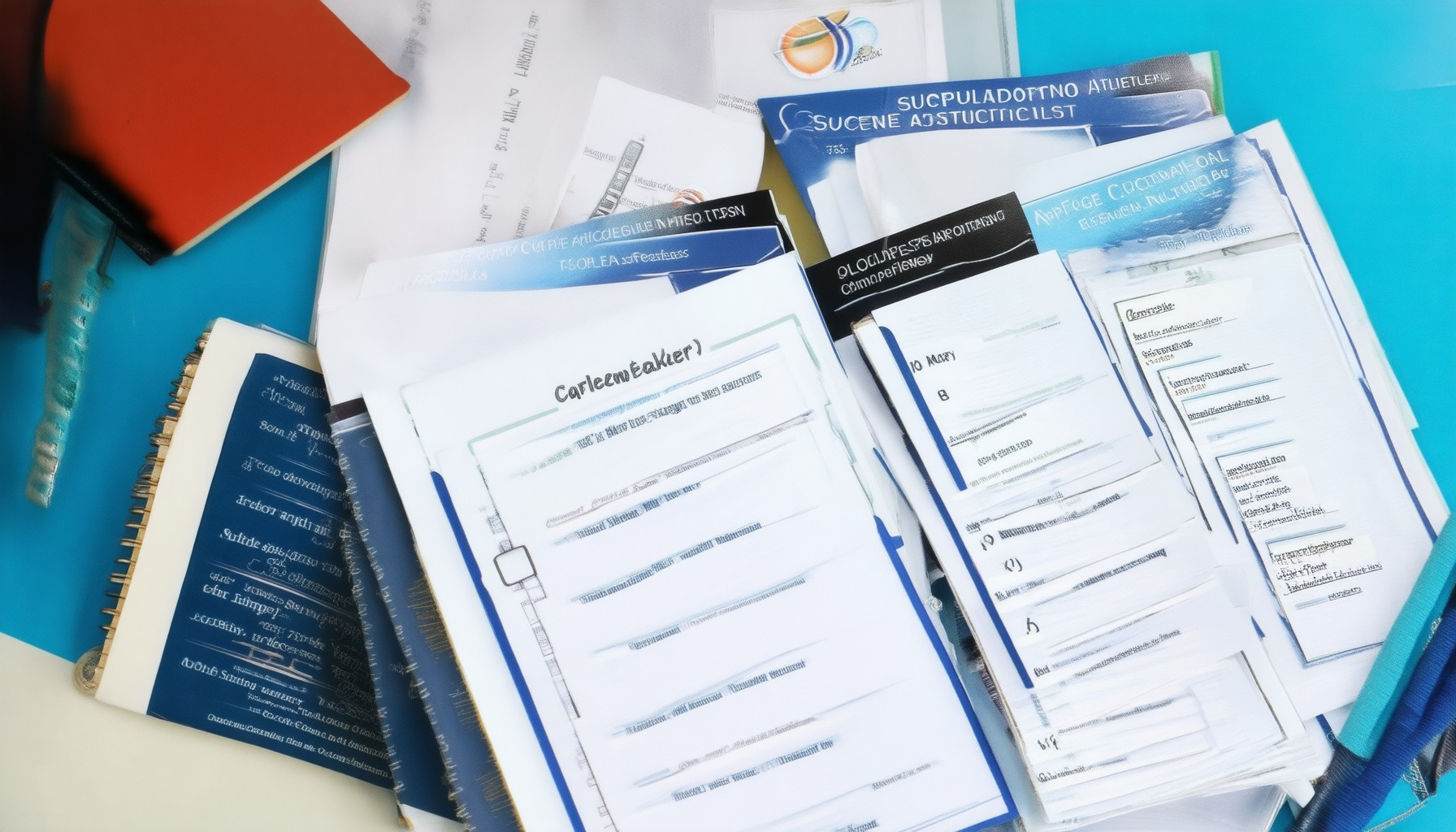The college application process is undeniably complex, filled with numerous moving parts and deadlines. For high school seniors and transfer students alike, navigating this journey can feel overwhelming. Whether you’re applying to a prestigious institution or a local community college, having a well-organized college application checklist is crucial to ensuring your application stands out. This comprehensive guide will walk you through the essential steps, providing a clear roadmap to help you stay on track and submit a polished, compelling application.
Information Needed for College Applications
To successfully apply to college, you need to gather and prepare several key components. Below is a structured overview of the essential information and materials required:
- Academic Records : Include official high school transcripts, GPA, and class rank. These documents showcase your academic achievements and progress.
- Resume : Compile a resume highlighting your academic history, extracurricular activities, volunteer work, and any relevant internships. This provides a snapshot of your accomplishments and experiences.
- Standardized Tests : Submit SAT or ACT scores, as many colleges require these. Additionally, include any AP or IB diplomas if applicable, as they enhance your academic profile.
- Essays : Prepare a personal statement that articulates your major and career goals. Consider including a unique experience or challenge that influenced your career choice to make your application stand out.
- Recommendation Letters : Secure letters of recommendation from teachers, mentors, or coaches who can vouch for your character and academic abilities. Provide them with guidelines on what to include.
- Interview Preparation : If interviews are required, prepare by practicing common questions and researching the program. Consider finding sample questions online to aid your preparation.
- Financial Aid Information : Apply for financial aid by completing forms like the FAFSA. Explore scholarship opportunities to reduce tuition costs.
- Application Process : Adhere to submission timelines and deadlines. Check each college’s specific requirements to ensure all necessary documents, such as essays and recommendations, are included.
Additionally, consider including a portfolio if you have relevant work, such as art projects or research findings, depending on the program’s requirements. Organize all materials neatly and ensure accuracy to avoid typographical errors or formatting issues.
What is an Application Checklist?
An application checklist is a structured and organized list of tasks or requirements that helps individuals ensure they complete a process effectively and efficiently. Whether it’s for a job application, school enrollment, or a home renovation project, a checklist serves as a guide to stay on track and meet all necessary criteria.
Key Components of an Application Checklist
- Goals : Clearly define the objectives or outcomes you aim to achieve.
- Tasks : Break down the process into manageable steps or actions.
- Deadlines : Set realistic timelines for completing each task.
- Requirements : Identify essential documents, information, or skills needed.
- Checkpoints : Include milestones to monitor progress.
Benefits of Using a Checklist
- Organization : Helps manage tasks efficiently.
- Reduces Stress : Minimizes last-minute rushes and missed details.
- Improves Efficiency : Ensures nothing is overlooked.
- Reduces Errors : Helps catch mistakes before they become issues.
Common Scenarios
- Job Applications : Includes resume submission, cover letter, interviews, and reference checks.
- Scholarship Applications : Lists academic history, essays, recommendation letters, and submission deadlines.
- Visa Applications : Requires passport copies, photos, application forms, and fee payments.
Why Use a Checklist?
A checklist is versatile and adaptable, making it suitable for various personal or professional applications. It allows individuals to tailor the process to their unique needs, whether they’re applying for a loan, enrolling in a course, or preparing for a major event.
Resources for Further Reading
For more insights and guides on staying organized, visit Enroll Maven and explore our comprehensive resource library designed to support your academic and professional journey.
By using a checklist, you can streamline your processes and enhance your chances of success in whatever application you’re undertaking.
What GPA is Good for College Applications?
A good GPA for college applications varies depending on the type of college and its selectivity. Here’s a breakdown:
Average GPAs by College Type
- Public Universities : Typically accept a GPA around 3.0–3.5, though this can vary by institution and major.
- Private Universities : Often require a higher GPA, around 3.5–4.0, especially for competitive programs.
- Top-Tier Private Universities (e.g., Ivies) : Expect a GPA of 3.8–4.0 or higher, particularly in fields like STEM or humanities.
How to Improve Your GPA
- Take Challenging Courses Early: Enroll in Advanced Placement (AP), International Baccalaureate (IB), or honors courses early to boost your GPA.
- Maintain Consistency: Aim for consistent grades across all subjects rather than focusing on just a few high grades.
- Seek Support: Utilize tutoring services, study groups, or academic advisors to stay on track.
Remember, while GPA is important, colleges also evaluate overall strength of application, including extracurriculars, essays, and recommendation letters.
How Do You Stand Out in the College Application Process?
To make your college application stand out, focus on showcasing your unique qualities and passion. Here’s a step-by-step guide to help you excel:
- Highlight Unique Qualities :
Colleges look for students who bring something special to their campus. Engage in activities that reflect your personality and interests. Whether it’s leading a school club, organizing events, or excelling in a particular field, highlight these achievements in your application. - Excel in Extracurricular Activities :
Participate in sports, debate clubs, or music groups. Demonstrating leadership and dedication can set you apart. Show how these experiences have prepared you for college life and future challenges. - Craft a Compelling Personal Statement :
Your essay should tell a story about who you are. Reflect on your values, goals, and experiences. Use specific anecdotes to illustrate your character and motivation. - Get Strong Recommendation Letters :
Seek recommendations from teachers or mentors who can speak to your strengths and potential. These letters add credibility and perspective to your application. - Ace the Interview :
Prepare thoughtful questions and demonstrate enthusiasm for the college. Show genuine interest in what the institution offers and how it aligns with your aspirations. - Build a Strong Alumni Connection :
If possible, connect with alumni from your desired college. Their insights can provide valuable advice and help you understand the school’s culture better.
By focusing on these areas, you can present yourself as a well-rounded candidate who offers unique value to the college community. Remember, colleges want to admit students who will thrive and contribute meaningfully to their environment.
How to Impress College Admissions
To stand out in the competitive college admissions landscape, it’s essential to present yourself as a unique and compelling candidate. Here are proven strategies to make a lasting impression:
1. Build a Strong Academic Foundation
- Maintain a high GPA: Colleges often prioritize academic performance. Aim to keep your cumulative GPA strong, especially in core subjects.
- Challenge yourself: Engage in advanced coursework that showcases your intellectual curiosity and critical thinking abilities.
2. Showcase Leadership and Initiative
- Lead projects: Demonstrate your leadership skills by initiating and completing meaningful projects, whether in school or extracurricular activities.
- Volunteer actively: Colleges value community involvement. Consistently volunteer to develop empathy and a sense of responsibility.
3. Highlight Unique Skills and Passions
- Develop niche talents: Whether it’s playing an instrument, coding, or designing, showcase your specialized skills to differentiate yourself.
- Pursue hobbies: Share your interests outside academics, as they reveal personality traits and dedication.
4. Write a Compelling Personal Statement
- Reflect authentically: Craft a personal statement that reflects your values, aspirations, and experiences. Make it genuine and specific.
- Seek feedback: Have your essay reviewed by teachers or mentors to refine your narrative.
5. Build Strong Relationships
- Connect with mentors: Establish relationships with teachers, counselors, and professionals who can vouch for your character and potential.
- Request recommendations: Secure letters of recommendation from those who know you well and can speak to your strengths.
6. Participate in Extracurricular Activities
- Join clubs: Engage in organizations that align with your interests, as active participation demonstrates commitment.
- Be a team player: Showcase your ability to collaborate and contribute positively to group efforts.
7. Apply Early Decision
- Consider early admission: Applying early can increase your chances if you’re confident in your application. Research deadlines and requirements carefully.
8. Utilize Resources Wisely
- Leverage tools: Use platforms like Enroll Maven to access guides and tips tailored to your needs.
- Stay organized: Keep track of application deadlines and requirements to avoid mistakes.
9. Stay Persistent and Positive
- Embrace feedback: View rejections as opportunities to grow and refine your approach.
- Stay focused: Maintain determination throughout the process, knowing that persistence pays off.
By implementing these strategies, you can create a compelling profile that captures the attention of admissions committees and increases your chances of acceptance. Remember, consistency, authenticity, and a proactive attitude are key to making a lasting impression.
What Stands Out to the Ivy Leagues?
The Ivy League schools are renowned for their exceptional academic programs, world-class faculty, and rigorous standards. Here are some key attributes that set them apart:
World-Class Faculty and Resources
Ivy League universities boast prestigious faculty members who are leading experts in their fields. These institutions often invest heavily in research and offer access to state-of-the-art facilities, libraries, and labs. Students benefit from hands-on learning experiences and the opportunity to work alongside top researchers.
Elite Academic Rigor
These schools are known for their challenging curriculum and high academic expectations. Admission to an Ivy League school is highly competitive, with students typically ranking in the top percentiles of their class. The rigorous coursework prepares students for leadership roles in various fields.
Exceptional Research Opportunities
Ivy League universities are hubs for cutting-edge research. Students have access to unique research opportunities, often working alongside Nobel laureates and distinguished scholars. This fosters innovation and contributes to significant advancements in science, humanities, and business.
Diverse Extracurricular Strengths
From varsity sports to theater productions, Ivy League schools excel in a wide range of extracurricular activities. Their strong commitment to holistic development ensures students grow academically, socially, and culturally.
A Global Network of Alumni
Ivy League graduates form a powerful alumni network that spans various industries. This network provides valuable mentorship, job opportunities, and lifelong connections, making these institutions highly sought-after for employers.
Enroll Maven is committed to helping students navigate the complexities of college admissions, offering valuable resources and guidance to succeed in this competitive landscape.
html <a href=”https://www.enrollmaven.com/” target=”_blank”>Learn more about Enroll Maven</a>









0 Comments